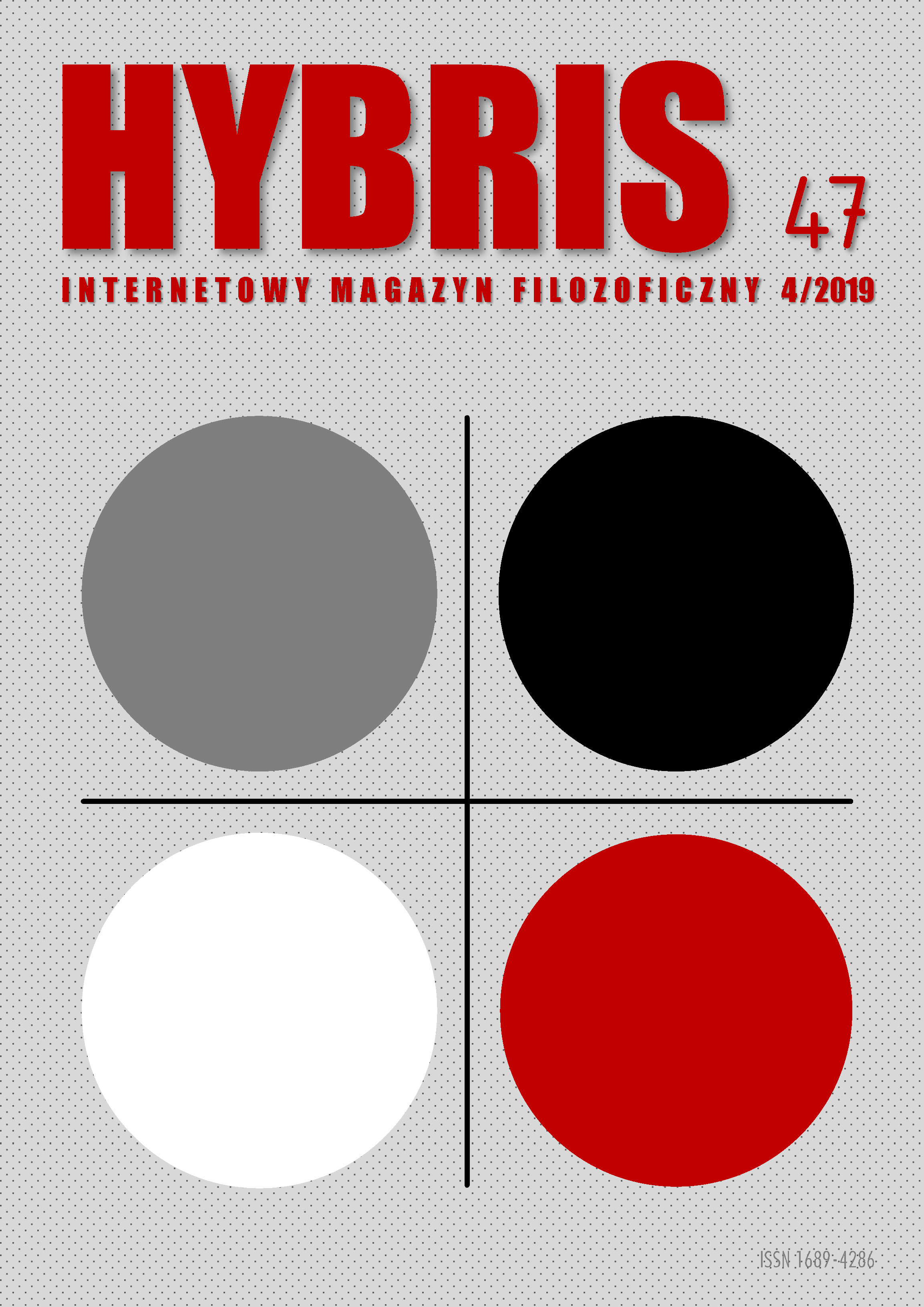Can you be both a conservative and a liberal? Frank Meyer and “fusionism”
DOI:
https://doi.org/10.18778/1689-4286.47.03Keywords:
Meyer, freedom, virtue, new conservatism, collectivist liberalismAbstract
The topic of this paper is the thought of Frank S. Meyer, a prominent figure in post-world-war-II american right-wing intellectual movement. One feature commonly ascribed to Meyer is the ambition to fuse (thus the term “fusionism” assossiated with his name) a classical liberal concern for individual freedom and more conservative persuasion of virtue being the ultimate goal of human existence. With the issue of right relation of freedom to virtue are grouped other issues, also meriting consideration: the problem of use of reason and tradition in political enquiry, the nature and proper role of the state, the relation of individual person to society (or other superindividual entities). We look at these issues throughout this paper. We look also at Meyer’s position in intellectual traditions of liberalism (broadly construed) and conservatism, concluding that he belongs to the liberal camp (classical liberal, more on the libertarian side), and not to the conservative one.
References
Bartyzel, J. (2010). Geneza i próba systematyki głównych nurtów libertarianizmu. W: W. Bulira, W. Gogłoza (red.), Libertarianizm. Teoria, praktyka, interpretacje (15-46). Lublin: Wydawnictwo Uniwersytetu Marii Curie-Skłodowskiej.
View in Google Scholar
Berns, W. (1998). The Need for Public Authority. W: G. W. Carey (red.), Freedom and Virtue. The Conservative/Libertarian Debate (55-67). Revised and updated edition. Wilmington, Delaware: Intercollegiate Studies Institute.
View in Google Scholar
Bozell, L. B. (1998). Freedom or Virtue? W: G. W. Carey (red.), Freedom and Virtue. The Conservative/Libertarian Debate (20-37). Revised and updated edition. Wilmington, Delaware: Intercollegiate Studies Institute.
View in Google Scholar
Carey, G. W. (1998). Introduction. W: G. W. Carey (red.), Freedom and Virtue. The Conservative/Libertarian Debate (ix-xxii). Revised and updated edition. Wilmington, Delaware: Intercollegiate Studies Institute.
View in Google Scholar
East, J. P. (1998). Conservatism and Libertarianism: Vital Complements. W: G. W. Carey (red.), Freedom and Virtue. The Conservative/Libertarian Debate (79-89). Revised and updated edition. Wilmington, Delaware: Intercollegiate Studies Institute.
View in Google Scholar
Edwards, L. (2013). Amerykański konserwatyzm. Krótka historia. Przeł. R. Giszczak. Lublin: Wydawnictwo Słowa i Myśli.
View in Google Scholar
Evans, M. S. (1998). Toward a New Intellectual History. W: G. W. Carey (red.), Freedom and Virtue. The Conservative/Libertarian Debate (90-101). Revised and updated edition. Wilmington, Delaware: Intercollegiate Studies Institute.
View in Google Scholar
Hayek, von, F. A.. (2012). Dlaczego nie jestem konserwatystą. W: F. A. von Hayek, Konstytucja wolności (378-390). Przeł. J. Stawiński. Warszawa: PWN.
View in Google Scholar
Juruś, D. (2012). W poszukiwaniu podstaw libertarianizmu. W perspektywie rothbardowskiej koncepcji własności. Kraków: Księgarnia Akademicka.
View in Google Scholar
Kirk, R. (2017). Konserwatywny umysł. Od Burke’a do Eliota. Przeł. A. Wincewicz-Price, J. Price. Kraków: Ośrodek Myśli Politycznej.
View in Google Scholar
Machan, T. R. (1998). Libertarianism: The Principle of Liberty. W: G. W. Carey (red.), Freedom and Virtue. The Conservative/Libertarian Debate (102-134). Revised and updated edition. Wilmington, Delaware: Intercollegiate Studies Institute.
View in Google Scholar
Meyer, F. S. (1996a). Collectivism Rebaptized. W: F. S. Meyer, In Defense of Freedom and Related Essays (3-13). Indianapolis: Liberty Fund.
View in Google Scholar
Meyer, F. S. (1996b). Freedom, Tradition, Conservatism. W: F. S. Meyer, In Defense of Freedom and Related Essays (14-29). Indianapolis: Liberty Fund.
View in Google Scholar
Meyer, F. S. (1996c). In Defense of Freedom. A Conservative Credo. W: F. S. Meyer, In Defense of Freedom and Related Essays (33-151). Indianapolis: Liberty Fund.
View in Google Scholar
Meyer, F. S. (1996d). Western Civilization: The Problem of Political Freedom. W: F. S. Meyer, In Defense of Freedom and Related Essays (209-224). Indianapolis: Liberty Fund.
View in Google Scholar
Miklaszewska, J. (1994). Libertariańskie koncepcje wolności i własności. Kraków: Uniwersytet Jagielloński.
View in Google Scholar
Nash, G. H. (2006). The Conservative Intellectual Movement in America Since 1945. Thirtieth-Anniversary Edition. Wilmington, Delaware: ISI Books.
View in Google Scholar
Nisbet, R. (1998). Uneasy Cousins. W: G. W. Carey (red.), Freedom and Virtue. The Conservative/Libertarian Debate (38-54). Revised and updated edition. Wilmington, Delaware: Intercollegiate Studies Institute.
View in Google Scholar
Nozick, R. (2010). Anarchia, państwo i utopia. Przeł. P. Maciejko, M. Szczubiałka. Warszawa: Aletheia.
View in Google Scholar
Rothbard, M. N. (1998). Frank S. Meyer: The Fusionist as Libertarian Manqué. W: G. W. Carey (red.), Freedom and Virtue. The Conservative/Libertarian Debate (135-162). Revised and updated edition. Wilmington, Delaware: Intercollegiate Studies Institute.
View in Google Scholar
Skarżyński, R. (1998). Konserwatyzm. Zarys dziejów filozofii politycznej. Warszawa: Wydawnictwo Naukowe Scholar.
View in Google Scholar
Szacki, J. (1981). Historia myśli socjologicznej. Część pierwsza. Warszawa: PWN.
View in Google Scholar
Szahaj, A., Jakubowski, M. N. (2015). Filozofia polityki. Warszawa: PWN.
View in Google Scholar
Teluk, T. (2009) Koncepcje państwa we współczesnym libertarianizmie. Wyd. II - poprawione. Gliwice, Warszawa: Instytut Globalizacji.
View in Google Scholar
Weaver, R. M. (1998). Conservatism and Libertarianism. W: G. W. Carey (red.), Freedom and Virtue. The Conservative/Libertarian Debate (68-78). Revised and updated edition. Wilmington, Delaware: Intercollegiate Studies Institute.
View in Google Scholar
Downloads
Published
How to Cite
Issue
Section
License

This work is licensed under a Creative Commons Attribution-NonCommercial-NoDerivatives 4.0 International License.






